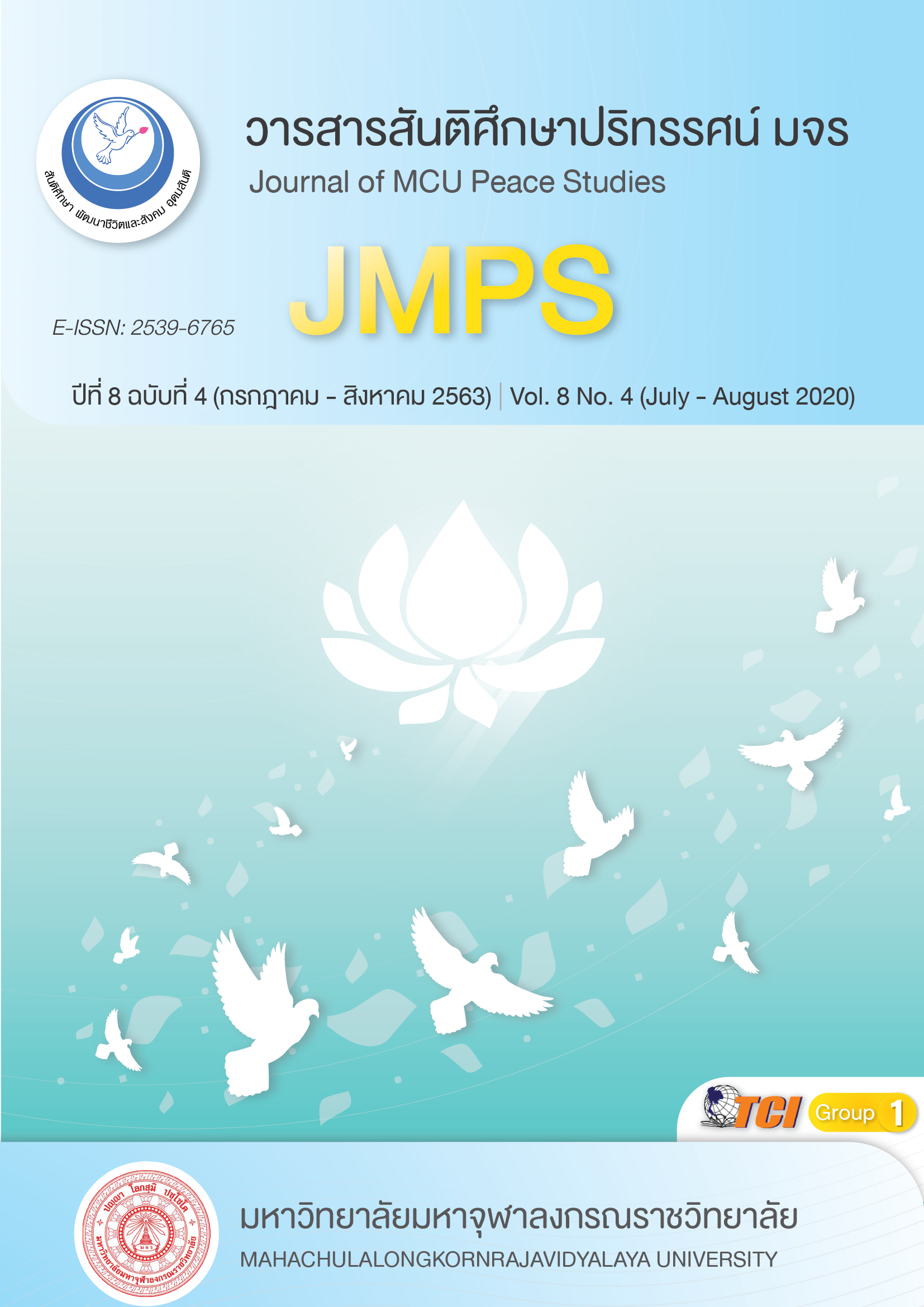The Guideline for Morality Cultivation of Youth at Phuttabutra Moral Training Center, Wat Nongloeng, Kham Khuean Kaeo District, Yasothon Province
Main Article Content
Abstract
The aims of this research were: 1) to study the problematic conditions of the youth in the present; 2) to study the dhamma principles for morality cultivation of youth; 3) to study the guideline for morality cultivation of youth at the Phuttabutra Moral Training center, Wat Nongloeng, Kham Khuean Kaeo district, Yasothon province. This study was carried out by means of the qualitative research methodology conducted by fieldwork, in-depth interview to obtain the empirical data. The research results revealed that the problematic conditions of the youth in the present can be seen in four aspects: gratitude, discipline, harmony and duties and responsibility. The principles that are used in the cultivation of morality for youth are: the five precepts that are basic ethics and principles for the young practitioners to remain in good deeds and improve their quality of life to the highest goal of life; Sangahavatthu-dhamma causing the youth to be generous, polite, voluntary for social development, adaptable and to work together happily; the four Iddhipada-dhamma principles is a virtue that helps people to practice successfully in various tasks. The guideline for morality cultivation of youth at Phuttabutra Moral Training center, is divided into 4 areas: gratitude, there are activities that raise the awareness of benefactors, such as the candlelight activities for mothers, making young people feel grateful to benefactors, the rob offering ‘for eliminating defilement’ activity to guide them to give back to their benefactors; discipline, using eating activities develops the youth in terms of punctuality, disciplinary, and adaptability to changes in the environment; harmony, applying Sangahavatthu-dhamma and activity of thought-chart presentation encourage young people practice unity collaboration, resulting work success according to the principles of Iddhipada-dhamma; duties and responsibility, the rob offering ‘for eliminating defilement’ activity allows youth an opportunity to confess their past mistakes and to make an intention to do good deeds in the future. The guidelines for cultivating moral in all 4 areas of the youth conduct are in the framework of the five precepts that are not to encroach the others and oneself.
Article Details
Views and opinions expressed in the articles published by The Journal of MCU Peace Studies, are of responsibility by such authors but not the editors and do not necessarily reflect those of the editors.
References
Bunthiabtikamporn (2006). Youth's Life Skill Development by Buddhabhavana:--A Case Study of the Virtue Camp of Wat Umong. (Master’s Thesis). Graduate School: Mahachulalongkornrajavidyalaya University. Thailand.
Chantana (2003). A follow up study of youth trained in the virtue project at Buddhaputta Camp of Panyanantaram Temple, Klong Hok Subdistrict, Klong Luang District, Pathoomthani Province. (Master’s Thesis). Graduate School: Thammasart University. Bangkok.
Department of Academic Affairs. (2009). Guide to organizing a moral camp for youth. Bangkok: The Agricultural Co-operative Federation of Thailand Press.
Department of Academic Affairs. (2009). Handbook for learning about social studies, religion and culture. Bangkok: Express Transportation Organization of Thailand.
Kasan (1999). A Study of Results of the Buddhist Poems Teaching for the Virtuous and Ethical Cultivation in the Yakhao School Pupils. . (Master’s Thesis). Graduate School: Mahachulalongkornrajavidyalaya University. Thailand.
Kongtong, S. (2014). The Effects Of The Cognitive Behavior Modification Program For Enhancing Public Mind Of The First Year Air Force Students Nurse, Royal Thai Air Force Nursing College, Directorate Of Medical Services. Journal oF MCU Social Science Review. 3(2), 174-184.
Mahachulalongkornrajavidyalaya University. (1996). Thai Tipitaka. Bangkok: MCU Press.
Phra Dhammapitaka (P. A. Payutto). (2010). Dictionary of Buddhism. (9th ed.). Bangkok: MCU Press.
Phrakru Wapisirithamma Siripunno (2015). The Consequence of Morality Training towards Living of Youths Yasothon Province. (Master’s Thesis). Graduate School: Mahachulalongkornrajavidyalaya University. Ayutthaya.
Phramaha Kriengsak Kittijayo. (2007). An Analytical Study of the Five Precepts and It’s Influenec on Social Control. (Master’s Thesis). Graduate School: Mahamakut Buddisht University. Thailand.
Phramaha Yothin Yodhiko (2019). Principles of the Fve Aspects of Natural Law with Ecology. Journalof Arts Management. 4(3), 173-189.
Pramaha Prakasit Thitipasitthikorn, Phrapalad Prapoj Yusamran & Sodprasert, S. (2020). Conscious Building the Good Citizenship in Community developmentand Urbanized Buddhist Community in Nakhon Pathom Province. Journal of Multidisciplinary in Humanities and Social Sciences. 3(1), 63-80.
Somdet Phra Ariyavongsagatanana Wad Wasano. (1985). Sangahavatthu-dhamma 4. Bangkok: MBU Pess.


